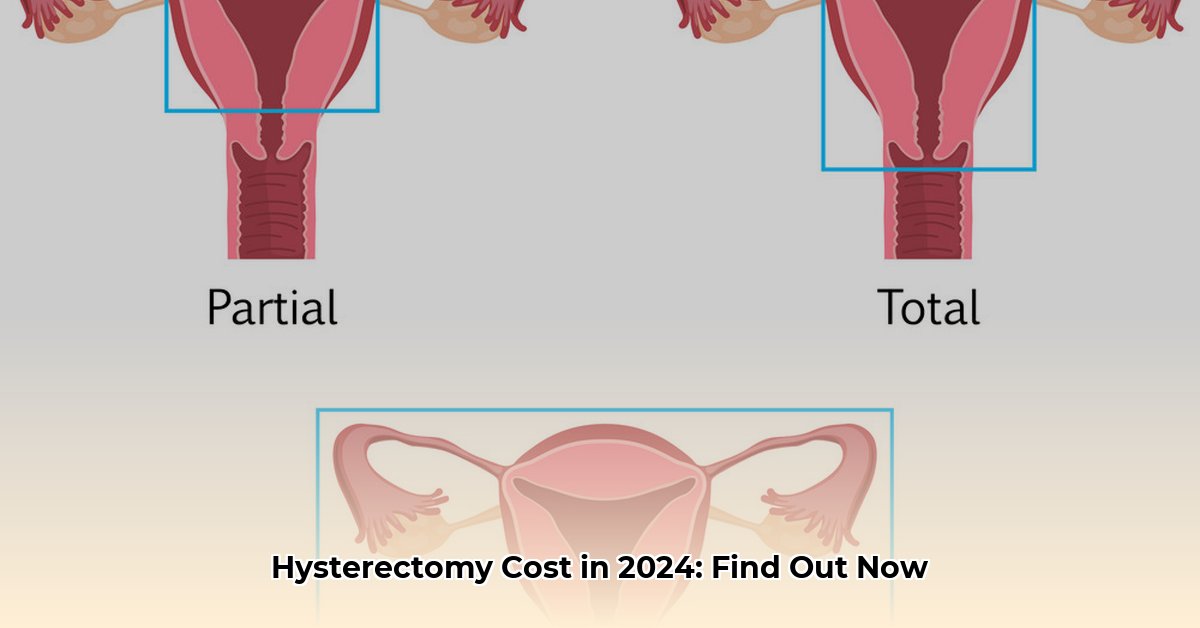This guide provides a comprehensive overview of hysterectomy costs in 2024, empowering you to navigate this significant medical and financial decision with confidence.
Decoding the Cost of a Hysterectomy
Planning for a hysterectomy involves understanding its financial implications. Like any major medical procedure, several factors influence the final cost, making it crucial to be well-informed.
Cost Range: Expect Variability
Hysterectomy costs can vary significantly, typically ranging from $5,300 to $42,816 or more. This broad range reflects the many variables affecting the price. Avoid relying on a single average cost, as it can be misleading.
Cost Factors at a Glance
Several key elements contribute to the overall cost:
- Type of Hysterectomy: The complexity of the procedure directly impacts the cost.
- Surgical Approach: Minimally invasive procedures often have different cost profiles than open surgery.
- Geographic Location: Healthcare costs fluctuate based on region and local market conditions.
- Facility: Hospitals and surgical centers have different overhead costs, affecting pricing.
- Insurance Coverage: Your plan’s specifics (deductible, copay, coinsurance) significantly influence your out-of-pocket expenses.
Detailed Explanation of Cost Factors
Let’s delve deeper into each factor:
Type of Hysterectomy
| Hysterectomy Type | Average Cost Range | Description |
|---|---|---|
| Total | $10,100 – $33,450 | Removal of the entire uterus and cervix. |
| Supracervical (Partial) | $7,257 – $25,535 | Removal of the upper uterus, leaving the cervix. |
| Radical | $22,500 – $42,816 | Removal of the uterus, cervix, surrounding tissues, and possibly ovaries and fallopian tubes. |
A radical hysterectomy, often performed in cancer cases, is the most extensive and typically most expensive.
Surgical Approach
| Surgical Method | Average Cost Range | Description | Recovery Time |
|---|---|---|---|
| Abdominal | $10,100 – $33,450 | Open surgery with a larger incision. | Longest |
| Vaginal | $7,257 – $25,535 | Removal through the vagina. | Shortest |
| Laparoscopic | $9,388 – $12,713 | Minimally invasive surgery using small incisions and a camera. | Moderate |
| Robotic-Assisted | $22,500 – $42,816 | Laparoscopic surgery assisted by a robotic system. | Moderate |
Minimally invasive techniques (laparoscopic and robotic) often have higher upfront costs due to specialized equipment but may lead to shorter hospital stays and faster recoveries, potentially reducing overall expenses.
Geographic Location
Healthcare costs vary considerably across the country. Metropolitan areas tend to have higher costs than rural areas.
Hospital/Facility
Hospitals typically have higher overhead than ambulatory surgical centers, influencing procedure costs.
Insurance Coverage
Understanding your insurance policy is crucial:
- Deductible: The amount you pay before insurance coverage begins.
- Copay: A fixed fee for each doctor’s visit or service.
- Coinsurance: The percentage of costs you share with your insurer after meeting your deductible.
- Pre-authorization: Many insurers require pre-approval for certain procedures, including hysterectomies. Contact your insurer before scheduling to verify coverage and obtain pre-authorization if necessary.
Alternatives to Hysterectomy
Depending on your condition, alternatives may be available. Discuss options like uterine fibroid embolization (UFE) or endometrial ablation with your healthcare provider.
Finding Current Cost Information
- Contact hospitals directly: Request detailed cost estimates for your specific procedure and location.
- Consult your insurance provider: Obtain a personalized estimate of your coverage and out-of-pocket costs.
- Utilize healthcare cost transparency tools: Explore online resources that compare prices in your area.
Additional Considerations
Negotiating Costs and Payment Plans
Don’t hesitate to discuss payment plans or negotiate costs with your hospital or provider. Many facilities offer financial assistance programs.
Emotional and Psychological Well-being
A hysterectomy is a significant life event. Address any emotional or psychological concerns with your healthcare provider, therapist, or support system.
Disclaimer
This information is for educational purposes only and is not a substitute for professional medical advice. Consult your healthcare provider for personalized guidance.
- Divided Food Containers Are Meal Preps Secret Weapon - February 7, 2026
- Food Kits for Adults Offer Fun DIY Cooking Adventures - February 6, 2026
- Food Making Kits Bring Easy, Fun Homemade Dishes to Your Kitchen - February 5, 2026










